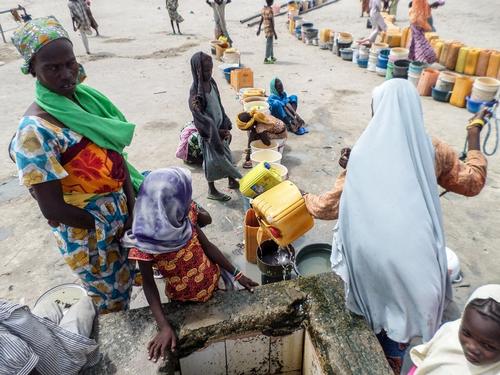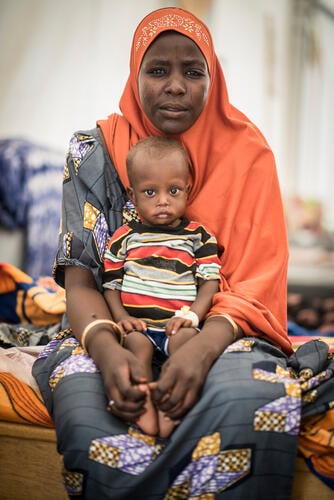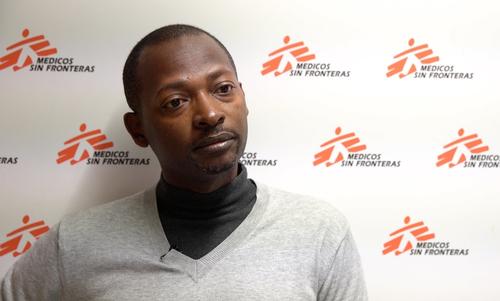The conflict in Borno State started in 2009 when Boko Haram launched attacks in Bauchi, Borno, Yobe and Kano. By 2014, Boko Haram controlled large swathes of territory in Borno State.
In 2015, Nigeria elected a new President who vowed to take back control of territory from Boko Haram and also stamp out corruption in the country. Since then the Nigerian army has been engaged in fighting with Boko Haram, including by launching airstrikes that began in 2016, in areas under Boko Haram control. The army has now taken back many cities and villages and is securing them.
The nature of the conflict between the Nigerian army and Boko Haram has changed to include military assistance from the neighbouring countries of Chad, Cameroon and Niger.
MSF Projects
Maiduguri
MSF has been present in Maiduguri on a permanent basis since April 2014 working on paediatric and maternal health and nutrition and previously controlled cholera epidemics on several occasions.
Today more than 1.1 million internally displaced people (IDPs) are living in Maiduguri (according to the International Organization for Migration), most of them within the host community, while the others are accommodated in camps (two informal camps and 11 official camps).
The camps
The population in most camps remained stable in August. However, there was an influx of IDPs in Muna Garage camp. In the meantime, IDPs returned back from Maiduguri with the army’s assistance on a voluntary basis, though many of them came back to Maiduguri because they did not find proper living conditions. In Maiduguri, MSF is conducting a health surveillance activity now covering all official camps and the two unofficial camps of Muna and Customs House, where high rates of mortality for children under five have been recorded.
On 6 and 7 September, MSF launched an operation in Custom House Camp. 1,136 children were screened for malnutrition. The severe acute malnutrition rate and moderate acute malnutrition rate were 20.8 per cent and 37.3 per cent, respectively. The team distributed to 1,500 families food rations for one month and relief kits including mosquito nets, jerry cans, soap, mats, and blankets. They also provided seasonal malaria chemoprophylaxis to 1,057 children and 109 medical consultations. In mid-September, MSF ran a similar operation in Muna Garage Camp. Food rations and relief kits were distributed to 2,500 families.
Maimusari and Bolori health centres
In Maiduguri, we run two heath centres, Maimusari and Bolori, where we run outpatient departments providing more than 2,100 consultations/week in each location with 45 per cent of consultations for children under five in Maimusari and as much as 71 per cent in Bolori. The centres also include ambulatory therapeutic feeding centres (ATFC) that provided treatment for an average of 318 patients per week in August in the two sites. In August, the screening of 4,918 children for malnutrition in Maimusari showed a severe acute malnutrition rate of 18.7 per cent and a moderate acute malnutrition rate of 41.2 per cent. In Bolori, the screening of 6,033 children showed a severe acute malnutrition rate of 8.9 per cent and a moderate acute malnutrition rate of 28.4 per cent.
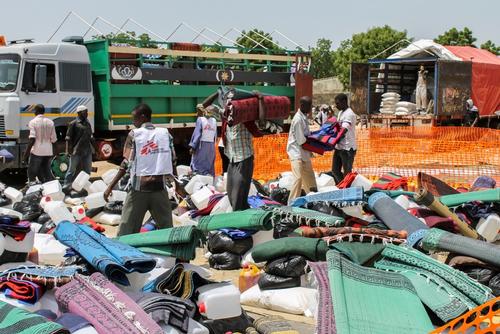
MSF also provides maternity services in the health centres (simple deliveries, antenatal care and postnatal consultations). 6,393 consultations took place in Maimusari and Bolori combined in August, and an average of 100 deliveries per week were assisted in Maimusari. In early August in Maimusari, we opened an inpatient department with 50 beds for paediatric patients and a paediatric intensive care unit. 153 patients were admitted in the paediatric IPD in August, with malaria being the most common illness treated.
Gwange inpatient therapeutic feeding centre
In Gwange, a district in Maiduguri, MSF runs an inpatient therapeutic feeding centre (ITFC) with a 110-bed capacity. The ITFC is under tents, in the compound of the Ministry of Health-run health centre. 387 patients were admitted in August, 21 of whom were children under the age of 6 months. To compensate for the lack of food, we started in late September to provide family food rations to each child admitted in the ITFC.
Bama
After Nigerian authorities and a local NGO organised the evacuation of 1,192 people requiring medical care from Bama area to Maiduguri in mid-June, an MSF team visited Bama with a military escort on 21 June and found a population in a catastrophic situation. Of the 800 children MSF screened, 19 per cent were suffering from severe acute malnutrition. Estimated mortality at that time was very high. Medical data from the health centre reported 188 deaths from 23 May 23 to 21 June, mainly from diarrhoea and malnutrition; counting of the graves in the cemetery behind the camp showed more than 1,200 graves dug since the IDPs had been gathered in the hospital compound. Five children died during the assessment.
Bama is a ghost town held by the army, where the IDP camp is located inside the compound of the hospital, under military control. An estimated 15,000 people are living in the camp, mostly women and children under the age of five. They live in makeshift shelters made of iron sheeting taken from houses and are totally dependent on outside help for food.
A team returned to Bama on 19 July with a military escort to provide medical and nutritional support via ATFC and medical consultations, as well as water and sanitation improvements. A referral system to Maiduguri was organised with State Emergency Management Agency (SEMA) ambulances and school buses.
The team returned in mid-August and mid-September for four days. The visits aimed at rapidly reducing morbidity and mortality among children under the age of five by providing therapeutic food to malnourished children (PlumpyNut®) as well as food rations for one month (beans, oil and BP5: fortified biscuits) for 2,500 families. During the last visit, 153 children were diagnosed with severe acute malnutrition and 360 with moderate acute malnutrition. Complicated cases were referred to Maiduguri. To improve the very poor sanitary conditions, 40 latrines were built in the camp.
Monguno
According to the SEMA, an estimated 73,400 IDPs are living in nine camps in Monguno, where there was almost no access to healthcare since January 2015 for the residents and IDPs. The UNICEF clinic and the ALIMA clinic are overwhelmed. Considering the lack of secondary healthcare, MSF opened an inpatient department on 1 September. We set up a paediatric inpatient services, an ITFC and an emergency room under tents, with an overall capacity of 50 beds. A total of 27 patients were admitted during the first week.
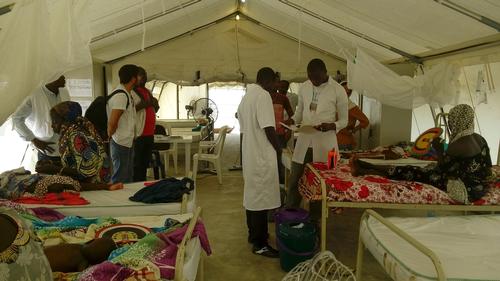
Damboa
The population of Damboa, southern Borno, is estimated to be between 60,000 and 75,000, with the majority of people displaced from the surrounding area and living in satellite camps in the town as well as in three makeshift camps in schools and the general hospital. More than half of the town is destroyed. While the situation in the town of Damboa has started to stabilise, and displaced people continue to arrive regularly, there is still insecurity in the direct surroundings.
An MSF team has been on the ground treating patients in Damboa since 17 July and now runs three clinics providing primarily healthcare and nutrition services, including an inpatient facility. The majority of patients seen have presented with malnutrition, malaria, respiratory tract infections, diarrhoea and/or skin infections due to the lack of hygiene. MSF is also running an outreach programme with health promotion, active case finding and surveillance. MSF also runs a water and sanitation programme to ensure increased water quantities in the camps. Existing latrines were emptied and are regularly being cleaned; additional new latrines were built. A distribution of non-food items to 15,000 families is taking place, aimed at the entire affected population. The team distributes two mosquito nets, two buckets, soap, two blankets, a potty, cups and a kettle per family. MSF has also responded to a measles outbreak and conducted a measles vaccination campaign for 28,000 children between six months and 15 years of age. Mortality rates remain above the emergency threshold. Since the start of the intervention, more than 15,000 patients have been treated including 500 children for severe acute malnutrition. As of next week, seven malaria treatment points will be opened in the community and the ITFC will be operational.
Kaga LGA
In Kaga local government area (LGA), located in western Borno state, MSF is currently running three ATFCs located in Beni Sheikh, the capital town of the LGA, Ngamdu and Minok. Malnourished children who need to be hospitalised from these three locations are referred to the ITFC in Damaturu hospital (the capital of Yobe State, located 62 kilometres west from Beni Sheikh), where MSF is also running a nutritional program. A new extension to the Damaturu ITFC has been built to accommodate new referrals from the three ATFC sites. From mid-June to the end of August, a total of 4,620 children under 5 years old were screened for malnutrition, 879 of whom were suffering severe acute malnutrition and were admitted in the ATFC programme in Beni Sheikh, Ngamdu and Minok. Moreover, more than 70 children have been referred to Damaturu ITFC. In the coming weeks, MSF will start treating the complicated cases of severe acute malnutrition in a new ITFC in Beni Sheikh town. At the same time, MSF is preparing to provide primary healthcare for children in one health facility of Beni Sheikh.
Gwoza LGA
After an assessment carried out in early August in Gowza LGA, MSF plans to start working in the coming weeks on nutrition and providing primary and secondary healthcare (with a specific focus on paediatric and maternal healthcare) for the general population of Gowza town (Hausari and Bulabulin). MSF is also planning a targeted food distribution. The estimated population of these two sites is 46,000 people. A team was deployed in week 36 to prepare the facility and launch activities. MSF is also planning to start activities in Pulka in the coming days.
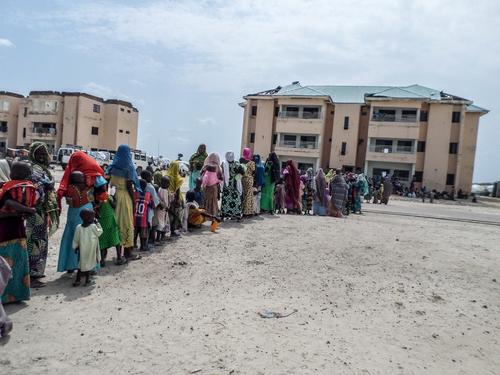
Banki
MSF teams from Cameroon have been providing emergency medical assistance and delivering food in Banki, over the Nigerian border, since July. The town has an estimated population of 30,000 and most are IDPs. People are blocked in the town for security reasons, and they lack access to food, water and adequate healthcare. MSF medical teams regularly cross the Cameroon-Nigeria border to provide assistance. Fourteen per cent of the children screened by MSF on 19 July were suffering from severe acute malnutrition, and nearly one in three children was malnourished. In response, MSF provided therapeutic food to 4,948 children and vaccinated them against measles. A total of 3,600 families received emergency food aid. Some 5,000 children received preventive malaria treatment.
Mortality rates in Banki remain very high. A recent survey by MSF showed that 70 out of 2,134 children under the age of five died from 20 July to September. 145 adults out of 8,396 died during the same period. The principal causes for death are diarrhoea and malaria.
Ngala and Gambaru
MSF teams from Cameroon also managed to access Ngala in Nigeria for the first time on 19 September, where they found 80,000 internally displaced people cut off from the outside world in a camp controlled by the Nigerian military. A rapid nutritional screening of more than 2,000 children under five years of age found that one in ten were suffering from severe acute malnutrition, and people reported having less than half a litre of water per day. MSF teams provided food and medical care and plan to scale up assistance.
In Gambaru, a town a few kilometres from Ngala, MSF teams found that over 15 per cent of children were suffering from severe acute malnutrition. The town’s 123,000 residents lack basic food supplies and have no access to healthcare. The only health centre was burnt down, and the road is too dangerous for people to leave to seek care elsewhere.



